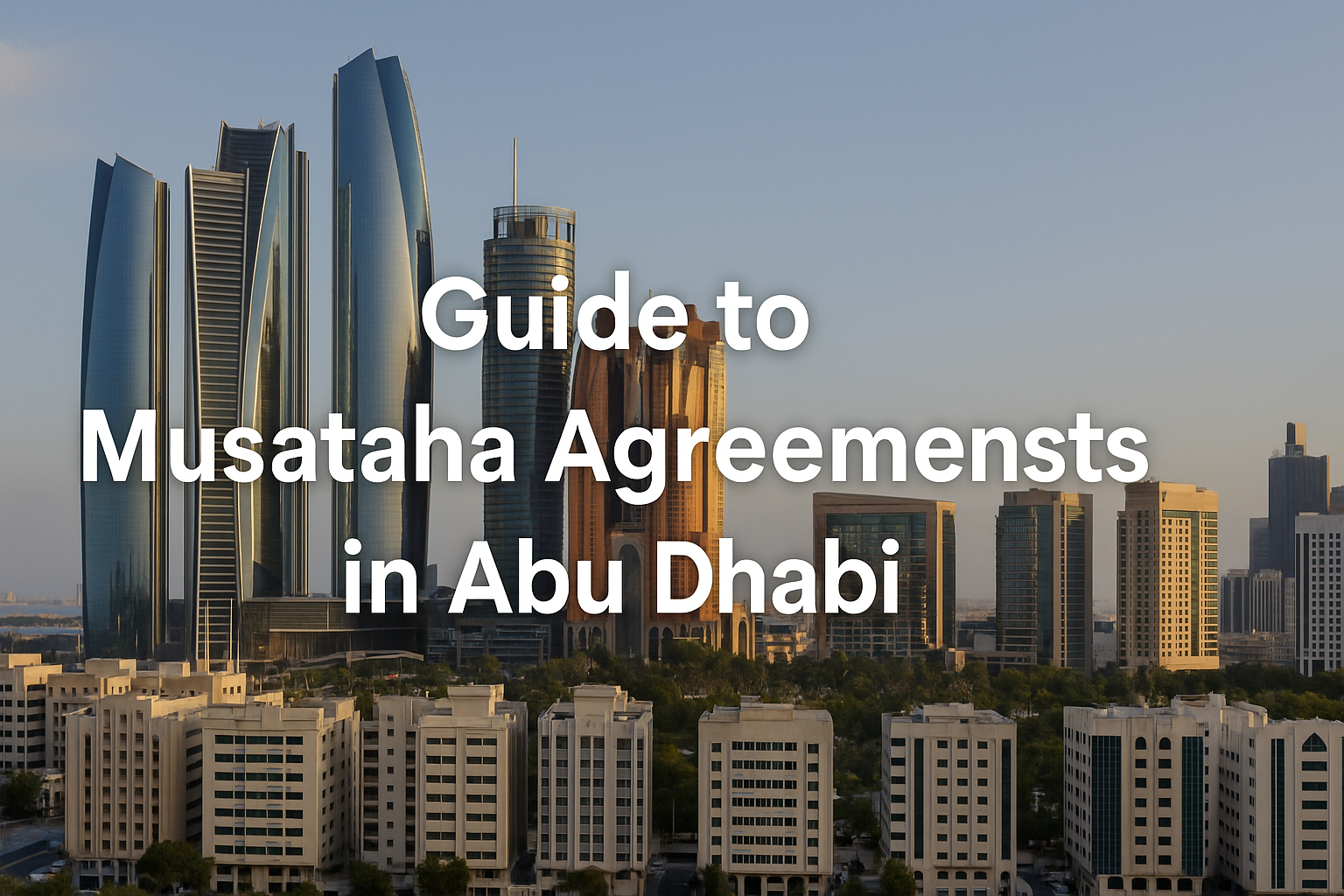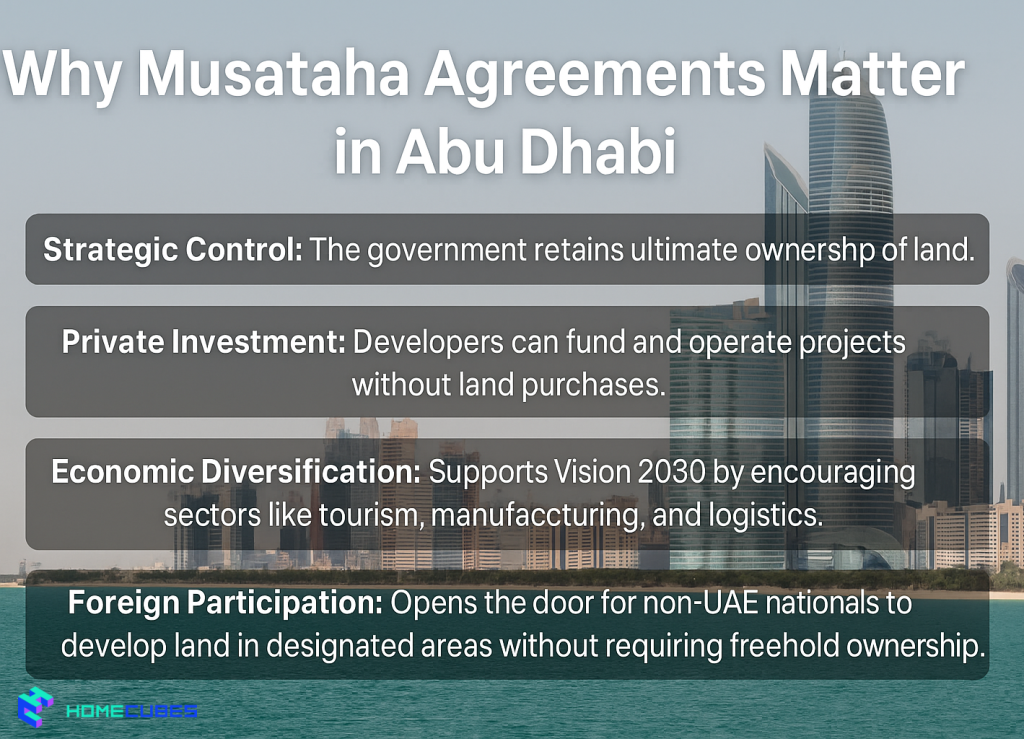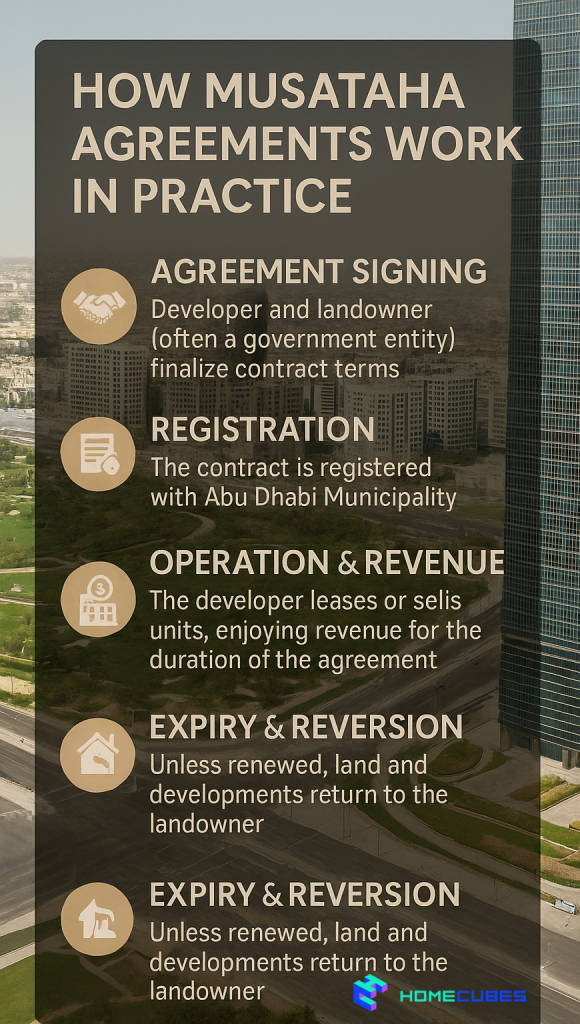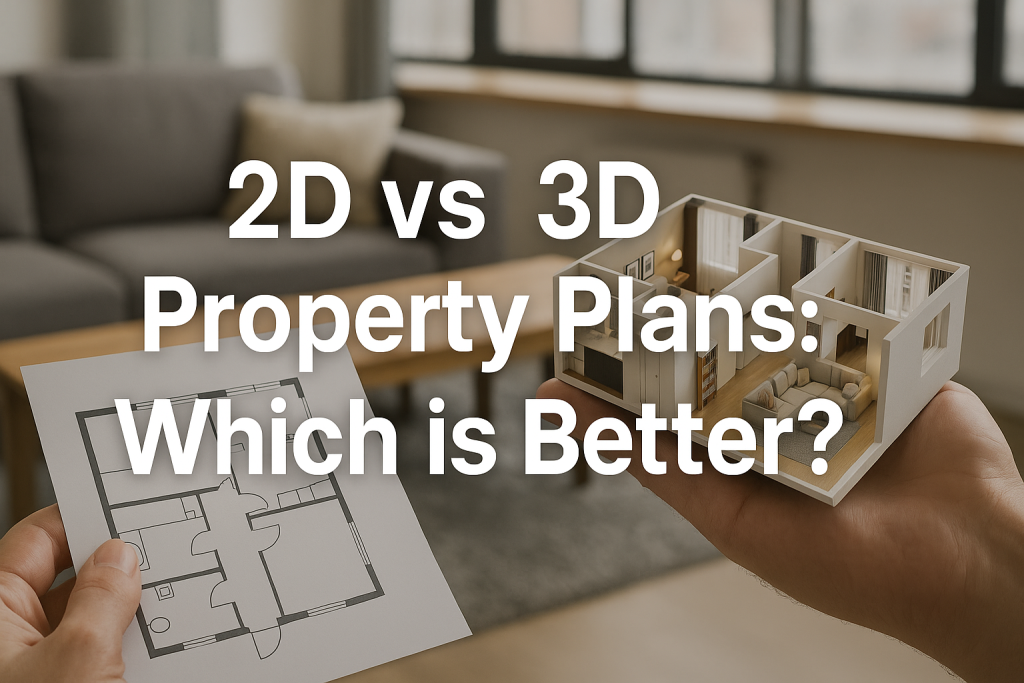

Table of Contents
- Introduction
- What Is a Musataha Agreement?
- Legal Framework Behind Musataha Agreements
- Why Musataha Agreements Matter in Abu Dhabi
- Benefits of a Musataha Agreement for Developers and Investors
- How Musataha Agreements Work in Practice
- Case Studies: Musataha in Action
- Mistakes to Avoid When Entering a Musataha Agreement
- Fees and Charges Associated with Musataha Agreements
- Challenges and Risks to Consider
- Frequently Asked Questions (FAQ)
- Conclusion
- Partner with Homecubes
Introduction
Abu Dhabi has emerged as one of the fastest-growing real estate markets in the Middle East, attracting global investors seeking long-term opportunities. While freehold ownership in designated investment zones is widely known, the emirate also provides alternative frameworks for developers and investors who want to participate in large-scale projects without purchasing land outright.
One of the most important tools enabling this participation is the Musataha Agreement. Recognized under the UAE Civil Code and codified by Abu Dhabi’s property laws, this agreement provides developers the right to build, develop, and benefit from land they do not own, typically for a term of up to 50 years, renewable once.
In many ways, the Musataha model balances the government’s long-term stewardship of land with the private sector’s ability to innovate, finance, and deliver projects. Whether in industrial zones, hospitality developments, or commercial real estate, Musataha agreements are becoming a defining feature of Abu Dhabi’s sustainable growth strategy.
What Is a Musataha Agreement?
A Musataha Agreement is a legal right in rem, meaning it attaches to the land itself rather than simply existing as a contract between two parties. It allows the holder to construct buildings, plant crops, or develop infrastructure on a plot owned by another party, while maintaining ownership of the improvements for the duration of the term.
Key features include:
- Duration: Usually 25 to 50 years, with one possible renewal.
- Ownership of Improvements: The Musataha holder owns the buildings or developments created during the term.
- Transferability: The right can often be transferred, mortgaged, or leased.
- Reversion: At the end of the agreement, unless renewed, ownership of both land and developments reverts to the landowner.
This structure is different from a leasehold, where the tenant usually does not own the buildings outright, and from usufruct rights, which grant use but not development.
Abu Dhabi Launches Musataha Tender for New Community Markets to Boost Sustainable Development https://t.co/yN9e20wl1H #bazaartimes
— Bazaar Times (@bazaartimes) August 16, 2025
For official guidance, the Abu Dhabi government’s property services portal, Dari, provides detailed information on Musataha contracts (Dari Abu Dhabi – Musataha Services).
Legal Framework Behind Musataha Agreements
Based on UAE real estate law, Musataha rights are recognized under Federal Law No. 5 of 1985 (the Civil Code), specifically Articles 1353–1360. These provisions make Musataha a legally enforceable right, ensuring the holder’s ability to construct and benefit from their developments.
Abu Dhabi’s Law No. 3 of 2005 on the Regulation of Real Estate further clarifies how Musataha agreements work in practice. Importantly:
- The agreements must be registered with the Abu Dhabi Municipality to be enforceable.
- They are considered rights in rem, meaning banks and courts recognize them as legal property rights, not just contractual arrangements.
- They can be mortgaged, sold, or inherited within the terms of the agreement.
Legal firms such as Al Tamimi & Company highlight Musataha as one of the key frameworks enabling international investment in the UAE property market (Al Tamimi – Real Estate Rights in the UAE).
Why Musataha Agreements Matter in Abu Dhabi

Abu Dhabi owns large portions of its land, particularly in strategic industrial and tourism zones. Selling this land outright is not always desirable for the government. Instead, granting long-term development rights through Musataha ensures:
- Strategic Control: The government retains ultimate ownership of land.
- Private Investment: Developers can fund and operate projects without land purchases.
- Economic Diversification: Supports Vision 2030 by encouraging sectors like tourism, manufacturing, and logistics.
- Foreign Participation: Opens the door for non-UAE nationals to develop land in designated areas without requiring freehold ownership.
This makes Musataha essential for mega-projects like Masdar City, industrial parks, and hotel resorts.
Benefits of a Musataha Agreement for Developers and Investors
Cost Efficiency
By avoiding the upfront cost of purchasing land, developers can allocate capital to construction and operations. For example, a developer who would have spent AED 100 million on purchasing land in top Abu Dhabi real estate hot spots in 2025, can redirect that investment into higher-quality construction and marketing.
Access to Financing
Because Musataha rights are registered and mortgageable, banks accept them as collateral. This provides access to project financing, reducing reliance on equity.
Legal Security
Registration ensures legal recognition, protecting both parties in case of disputes.
Long-Term Control
With terms of up to 50 years, developers enjoy decades of control, allowing them to generate revenue and recover investment comfortably.
Flexibility for Foreign Investors
Foreign developers restricted from freehold ownership can still participate, particularly in investment zones.
How Musataha Agreements Work in Practice

The process generally involves:
- Agreement Signing – Developer and landowner (often a government entity) finalize contract terms.
- Registration – The contract is registered with the Abu Dhabi Municipality.
- Development Phase – The developer constructs the project, whether residential, commercial, or industrial.
- Operation & Revenue – The developer leases or sells units, enjoying revenue for the duration of the agreement.
- Expiry & Reversion – Unless renewed, land and developments return to the landowner.
This model ensures government oversight while allowing private sector innovation.
Case Studies: Musataha in Action
Masdar City
Masdar City, Abu Dhabi’s flagship sustainable development, has relied heavily on Musataha agreements. Developers from around the world entered long-term contracts to build offices, residential communities, and research facilities. This model provided secure investor participation while maintaining government control over land.
Industrial Development Example
In Abu Dhabi’s KIZAD (Khalifa Industrial Zone), Musataha agreements are frequently used for logistics hubs and factories. Multinational corporations can build and operate facilities under Musataha while avoiding the cost of land ownership.
These case studies illustrate how Musataha agreements foster both urban innovation and industrial growth.
Mistakes to Avoid When Entering a Musataha Agreement
- Failing to Register: Without registration, agreements may not be enforceable.
- Ignoring Renewal Clauses: Developers must clarify extension rights at the start.
- Overestimating ROI: Projects should model financial returns conservatively, accounting for eventual reversion.
- Not Reviewing Land Use Restrictions: Certain plots are restricted to industrial, tourism, or residential purposes only.
- Weak Legal Advice: Entering without legal due diligence may expose investors to avoidable risks.
Fees and Charges Associated with Musataha Agreements
While Musataha avoids the high cost of purchasing land, there are associated expenses:
- Registration Fees – Paid to Abu Dhabi Municipality, typically based on contract value.
- Annual Musataha Rent – Agreed between landowner and holder, often linked to land value.
- Permit and Service Fees – Infrastructure or zoning-related charges.
- Maintenance and Operations Costs – Responsibility of the Musataha holder.
For many developers, these costs are significantly more efficient than buying freehold land, especially for projects spanning decades.
Challenges and Risks to Consider
- Renewal Uncertainty – Extension is not guaranteed and must be negotiated.
- Reversion Risk – At expiry, improvements revert to the landowner.
- Market Volatility – Long-term agreements must account for changing demand.
- Dispute Resolution – Misaligned expectations can lead to legal disputes.
Frequently Asked Questions (FAQ)
- Is a Musataha Agreement the same as a lease?
No. A lease provides use rights only, while Musataha grants construction and ownership of improvements. - Can foreigners hold Musataha rights?
Yes, particularly in designated investment areas. - How long does a Musataha Agreement last?
Typically 25 to 50 years, renewable once. - Can Musataha rights be mortgaged?
Yes. Banks in the UAE recognize them as mortgageable property rights. - What happens at expiry?
Unless renewed, land and improvements revert to the landowner. - Are Musataha agreements transferable?
Yes, they can often be sold, leased, or inherited. - Are Musataha rights recognized in court?
Yes, once registered, they are legally enforceable. - Do developers pay annual fees?
Yes, annual land-use payments are typically part of the agreement. - Is Musataha used only for large projects?
No, while common in mega-projects, it can also apply to smaller developments. - How do Musataha agreements compare globally?
They resemble long-term leasehold systems in other jurisdictions but with stronger development rights.
Bottomline
The Musataha Agreement is a cornerstone of Abu Dhabi’s real estate framework, balancing investor participation with government land stewardship. By providing developers with long-term rights to build, mortgage, and profit from projects, Musataha agreements have enabled landmark developments such as Masdar City and KIZAD industrial hubs.
For investors, this model offers cost efficiency, legal security, and access to prime land without outright ownership. For Abu Dhabi, it ensures sustainable development aligned with Vision 2030.
Partner with Homecubes
At Homecubes, we recognize the growing importance of frameworks like the Musataha Agreement in shaping Abu Dhabi’s property sector. While our real estate tokenization and investment services are pending final approval from VARA, we are preparing to guide clients on how innovative ownership models can be combined with blockchain-powered solutions for smarter investing.
📩 To explore how Musataha structures could influence your property investment strategy, contact Homecubes.










